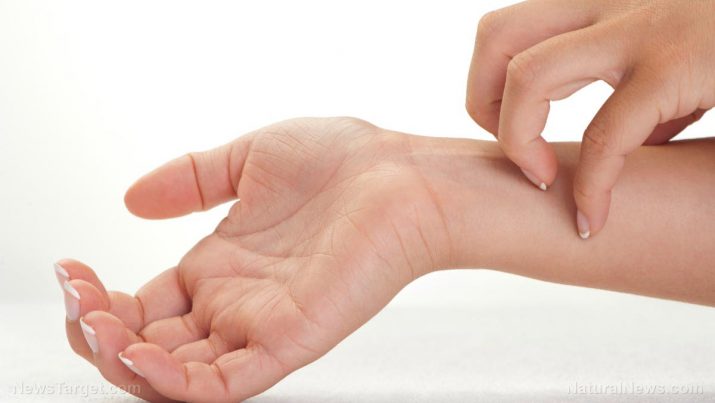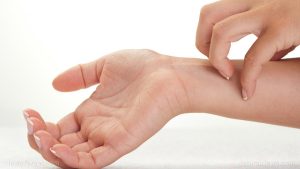
Myiasis – causes, side effects and treatments at NaturalPedia.com
Thursday, May 17, 2018 by Zoey Sky
http://www.naturalpedia.com/myiasis-causes-side-effects-and-treatments-at-naturalpedia-com.html

Myiasis is an infectious disease spread by fly larva. The disease often occurs in subtropical and tropical areas such as countries in Africa, the Caribbean Islands, Central America, and South America.
The flies transmit larvae to patients in three ways:
- Some flies attach their eggs to mosquitoes while the former wait for the latter to bite individuals. The fly larvae then enters the host via these bites.
- The larvae of other flies, called screwworms, can enter people’s skin through their bare feet when they’re walking through soil with fly eggs. In some cases, screwworms may attach themselves to people’s clothes and then burrow into their skin.
- Other flies deposit their larvae on or near a sore or wound. The eggs are then deposited in sloughing-off dead tissue.
The flies that usually cause myiasis in humans are Dermatobia hominis (human botfly) and Cordtlobia anthropophagi fly (tumbu fly). Myiasis is also called blowfly strike, fly-blown, and maggot infestation.
Myiasis is uncommon in the U.S., and most patients who are infected with the disease develop it after traveling to tropical areas in Africa and South America.

Known side effects of myiasis
The general side effects of myiasis usually include:
- Boils
- Diarrhea
- Vision problems
- Vomiting
The signs and symptoms of myiasis can also vary depending on the location of the infection. The side effects of cutaneous myiasis include:
- Painful and slow developing ulcers
- Sores and boils that persist for a long period
The side effects of nasal myiasis include:
- Facial edema/swelling of the face
- Fever
- Nose blockages
- Nose congestion
- Nose irritation
The side effects of aural myiasis include:
- Buzzing noises
- Crawling sensation in the region
- Hearing disturbances
- Smelly discharge (this is a rare side effect)
The side effects of opthalmomyiasis include:
- Redness of the eye
- Severe eye irritation
- Swelling of the eyes
Risk factors for myiasis may include:
- Advanced age
- Children with mental retardation
- Having untreated and open wounds
- Poor hygiene and sanitary conditions
- Psychiatric illness
- Traveling to tropical and sub-tropical regions
Body systems harmed by myiasis
Myiasis may cause the following complications:
- Extensive erosion of the eyes, face, and nose — This may occur if the larvae feed on the mucous membranes in these areas.
- Infected individuals may develop allergies — Can occur if the larvae are not completely removed.
- Meningitis — The inflammation of the protective coverings of the brain.
- Pin-site myiasis — A very rare complication that may occur when a patient who has a spinal fracture is fixed with a pin to stabilize the fracture.
- Pneumocephalus — Refers to the presence of air/gas in the cranial cavity.
- Secondary pyogenic/pus infection.
Food items or nutrients that may prevent myiasis
The following foods or nutrients can help prevent myiasis and boost the immune system:
- Broccoli — Broccoli is full of vitamins and minerals. It is rich in vitamins A, C, and E, along with other antioxidants and fiber.
- Citrus fruits — Citrus fruits contain vitamin C that can strengthen the immune system and fight off infections. Sources include clementines, grapefruit, limes, lemons, oranges, and tangerines.
- Garlic — Garlic can help fight infections. It also has immune-boosting properties thanks to sulfur-containing compounds like allicin.
- Ginger — Ginger can help reduce inflammation and soothe inflammatory illnesses (e.g. a sore throat).
- Red bell peppers — Red bell peppers contain at least twice the vitamin C content of citrus fruits. They also have beta-carotene.
- Spinach — Rich in vitamin C, spinach also contains various antioxidants and beta-carotene that can boost the immune system.
Treatments, management plans for myiasis
Myiasis is usually treated via the surgical removal of the fly larvae. After a medical professional operates on the patient, the wound requires daily cleaning.
Proper hygiene is crucial when caring for the post-surgical wounds of a patient with myiasis. In some cases, medication may be prescribed depending on the type of larva that caused the infection.
Where to learn more
- 7 Plants that Repel Insects
- 25 Powerful Health Benefits Of Thyme Oil
- Home Pest Control without the Toxic Chemicals
- Insect-killing “laser battle robot” can zap 20 insects per second
- Natural bug busters that are non toxic and effective
Summary
Myiasis is an infectious disease spread by fly larva.
The general side effects of myiasis usually include boils, diarrhea, vision problems, and vomiting.
Myiasis may cause complications like allergies, meningitis, pin-site myiasis, pneumocephalus, or secondary pyogenic/pus infection.
Broccoli, citrus fruits, garlic, ginger, red bell peppers, and spinach can help prevent myiasis and boost the immune system.
Myiasis is usually treated via the surgical removal of the fly larvae. After a medical professional operates on the patient, the wound requires daily cleaning. In some cases, medication may be prescribed depending on the type of larva that caused the infection.
Sources include:
Tagged Under: Tags: myiasis





